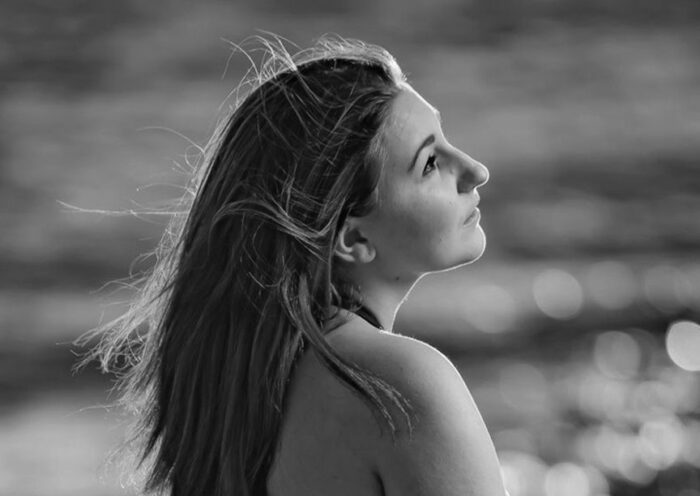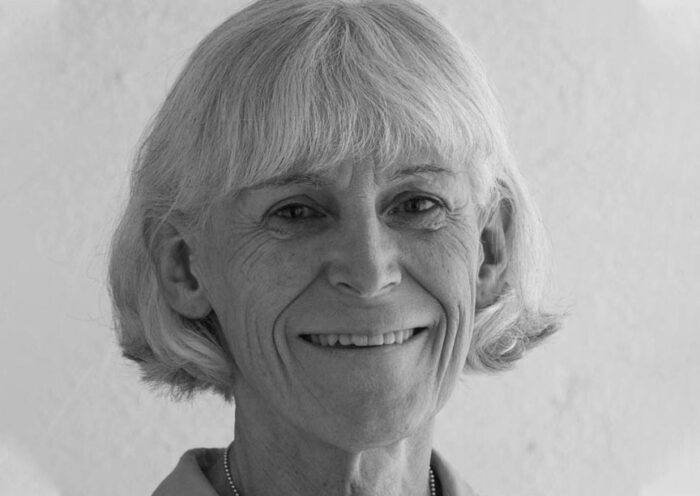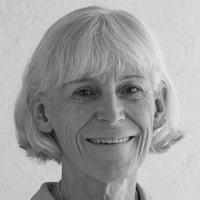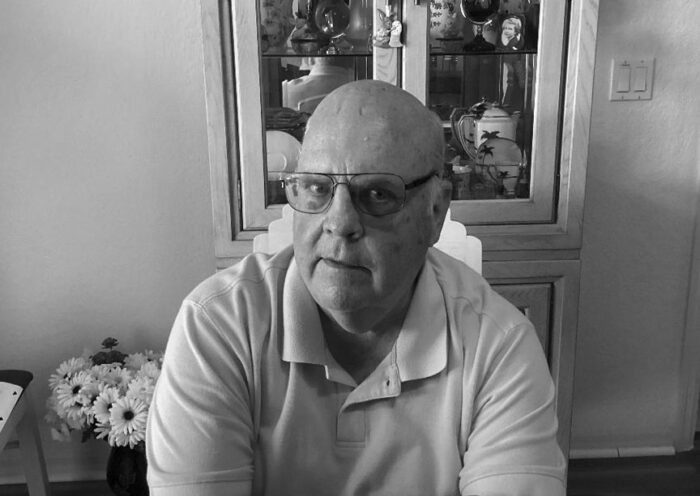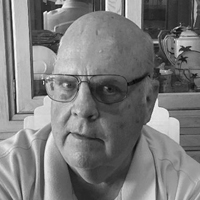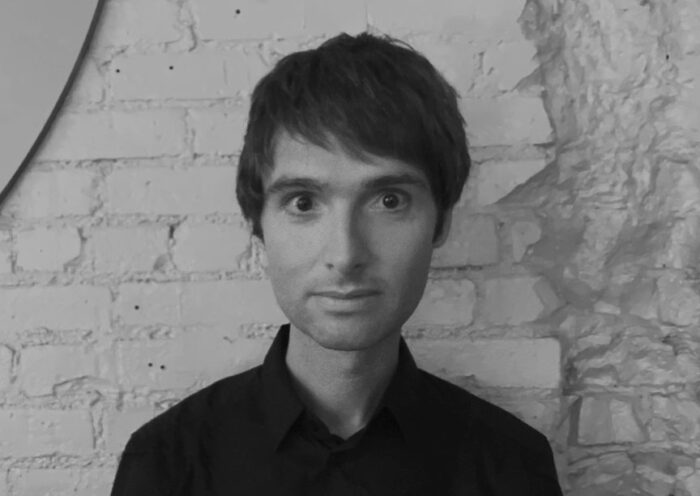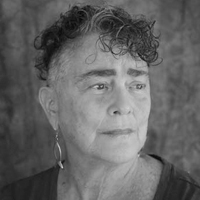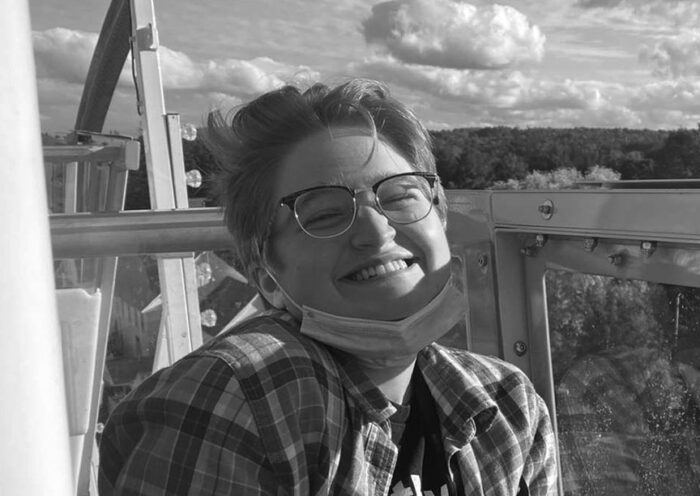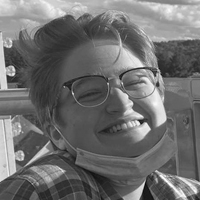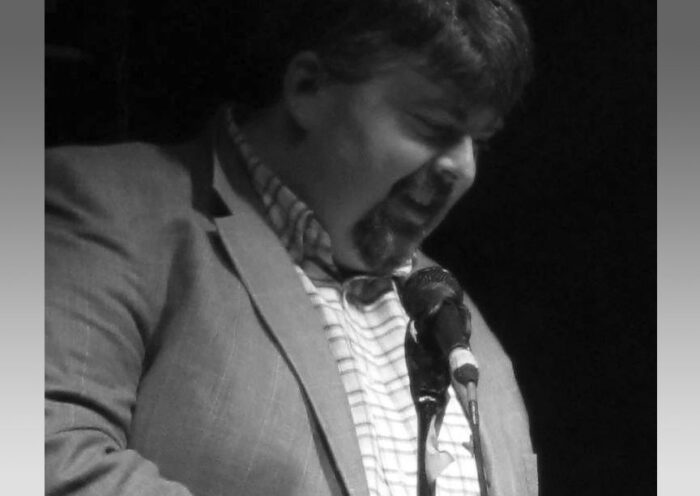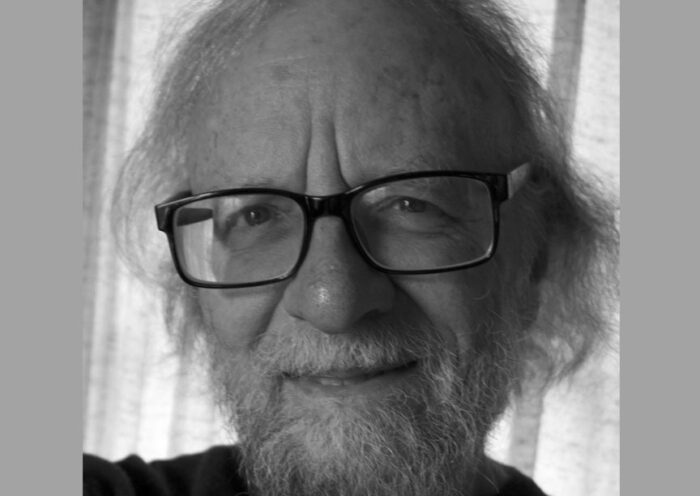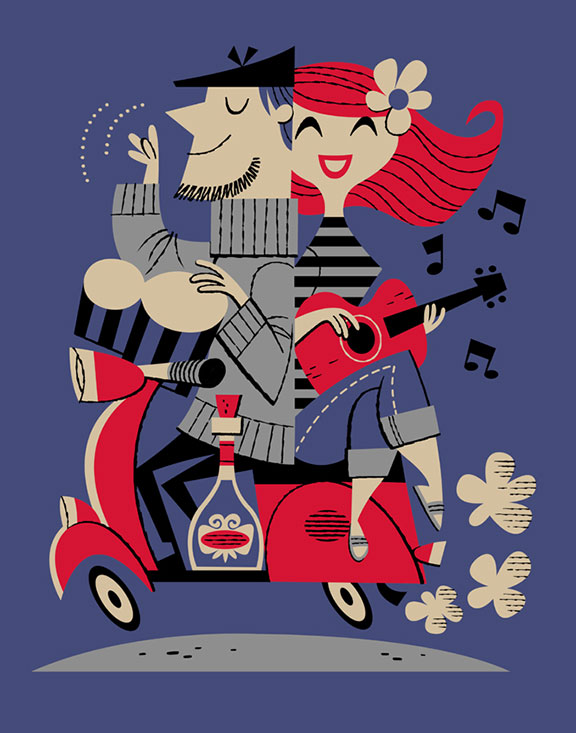Man Is
by Jennifer Benningfield
ONE
The middle-aged man’s hands would not stop moving—tamping down and slicking back his thin cinnamon hair, wiping the oak plywood, tickling the air—and after ten minutes he feared the worst. His eyes, agleam with anticipation, followed every contour, absorbed each color.
He looked down. The light blue polo shirt and crisp khakis provided inoffensive cover for a mild “life gut.” The white towel with thin red and white stripes running down the center had many brothers.
And he was at the head of the family.
Howie’s House. A neighborhood spot, cozy and friendly. Sitting kitty-corner from a convenience store, directly next to a laundromat, one block south of the smallest pizza joint per square foot in the whole state. A nice enough place to depressurize and re-humanize.
The bar represented one tier of a multi-tiered dream. A friend of a friend owned the space, previously leased to a seafood joint that lasted less than a year. All three men were partners in the bar—HTC, LLC—but Howie had the dream.
He glanced back at the shelves, solutions in neat rows, some clear, others murky, each neat and ready.
The door opened. Howie released a breath he was entirely aware that he’d been holding.
“See the time. 5:42 Eastern. And we’re just now getting our first customer.”
“It is an honor, a privilege but above all, a thrill. Let’s celebrate with a shot of Mark and a pint of whatever beer. Bartender’s choice. Anyway. Glad we’re not out West or I’d really feel like a sad drunk. Best seat in the house here. Right smack dab in the center. Guess that’s good form. Who cares if it’s not. It’s a free country, right.”
“One of many.”
The grimace on Old Guy Oscar’s face had little on the one that appeared when the shot hit his throat.
“Like the layout, kid. Solid selection.”
“Forty-seven brands.”
“Why not fifty?”
“I ordered what I felt necessary.”
“Huh. Smart. I suppose. One thing–that bottle of Wild Turkey? You won’t crack the top on that son-bitch opening week. Unless you open it up outta spite.”
Howie shrugged and removed the shot glass.
“Nice set-up, I mean that.”
“Just the standard luxuries.”
“‘The standard luxuries,’ huh. What a funny phrase. Funny-sounding, anyway. What do you have besides Budweiser?”
“Heinekin, Miller, Michelob.”
“Look, don’t misunderstand me, kid. We want this place to succeed. We want you to have a reason to reorder Wild Turkey.”
Howie’s face brightened with the sound and sight of a swinging door, grateful for any reason to tear his attentions from the sallow-faced fogey hunched over his drink.
“Broke any glasses yet or what.”
“Not yet.”
“Well, day ain’t over. What about food?”
“Food.”
“Yeah, ya doof. Food.”
“Why should I serve meals?”
“Did I say ‘meals’? I meant more along the lines of sandwiches and soups and desserts. Comfort food. Simple.”
“And affordable.”
“Right. Don’t be greedy, Howie. Word’ll get out.”
Howie rapped the knuckles of his dominant hand against the top of the bar. “Suggestions duly noted, gentlemen. Need another, Oscar?”
“I hate beer. But it kills the headaches. My wife says”–Howie held out a hand, waiting for the older man to finish his final pull–“take aspirin, they won’t damage your liver!’ Yeah, right, but they can and will damage your stomach lining. Happened to a guy I know. Can’t have aspirin anymore. Or wine.”
“Teddy?”
“Big day champ! Gimme a gin and tonic and quick. I gotta wash dinner out of my mouth. My friend at work drove me by Taco Bell on the way home. I normally avoid that place but he swore I’d love the chicken burrito.”
“Gin and tonic, ya poor gullible bastard.”
After three hours, Howie’s House had welcomed a dozen guests, including seven he didn’t even know.
“Can we get a free drink for considerably bringing down the median age of your average customer or what.”
“No.”
“Worth a shot, worth a shot. Wait, how about a free shot?”
“Also no.”
“Another one, Sammy?”
“Nah, I’m done for the night.”
“Just two? What, one for each tit?”
“I preach personal responsibility and I practice it as well. So shut your shot-hole.”
“You live a two-minute drive from here, Saint.”
“A lot can happen in 120 seconds.”
After the last man at the door had bellowed his farewell, Howie finally unclenched. Good day. Good customers. He couldn’t wait to see if they’d become regulars.
TWO
“Pretty sure the main reason this show’s so popular is people wanna see the poor bastard die.”
The bartender’s peppermint breath hit Marty’s face like a stranger’s kiss. The television screen showed a robust man seated at a diner table, stuffing his face with ludicrous amounts of red meat and white bread as a carefully gathered crowd of well-wishers gaped and hooted.
“I used to want to do that,” Marty admitted. “Well not that, exactly. Competitive eating. Yeah. Wanted to do that.”
“Get out.”
“No lie. Don’t mean like those maniacs who eat all the hot dogs up in Coney every July 4th. I just wanted to be a local legend. Found a guy in my neighborhood who used to compete at some fairs and hell, he mentored me.”
“When was all this?”
“Long time ago. I was in my mid-30s.”
“Not that long ago.”
“Feels like it. Anyway. This was in January when I had the bright idea, and my mentor decides I should aim for the pie-eating contest at the fair in Frederick that August. So I start training. An eating contest is just like a race. Gotta get in shape. Not to mention, there’s rules. They bind your hands, for instance. You gotta eat those pies just like a pig. Apple filling up your nose, all over your face. So I ate two pies a day, hands tied, while he timed me. For seven months.”
“How much weight did you put on?”
“None, fella. I started a vigorous exercise routine and drank nothing but water. I was the healthiest pie-eating son of a bitch in the whole western side of the state. So, time comes. The contest is, whoever eats five apple pies the quickest wins two hundred bucks. Big money then, fella.”
“Still is for some of us.”
“Hmm. Day of, all I ate was a carrot. That was what my mentor suggested. A carrot, or celery, something you wouldn’t touch otherwise. I got up on stage. There were four other contestants, three judges, one of ’em my pastor, ’bout a hundred people waiting. I myself drove up there with my sister and her little kids.”
Marty took another drink and winced.
“All the pies were made by women who went to St. John’s Methodist. None of that store-bought nonsense. So I’m standing there, looking for my sister and her kids in the crowd, thinking how I done all I done, how I stretched my stomach, how I never wanted to see another apple after all this, and then I see…them.”
“Them.”
“By the side of the stage. Just standing there. Paramedics. In case of an emergency. That did it. I blew before the whistle did,” Marty groaned.
“Oh no. But wait, that was before the competition started, right? You still–“
“They already had a pie in front of us. I upchucked on mine and there was…collateral damage.”
Marty’s description of infamy deferred exhausted not only him, but every other patron at the bar. The next thirty minutes passed uneventfully, with a few of the men, expressions dulled, watching the TV and others staring balefully into their beverage.
“Cold in here.”
“It ain’t cold. For the fourth time.”
“To me it’s cold.”
“Start wearing layers.”
Marty’s retort died in his throat when he felt a body occupy the stool to his left. He turned his head to see a crestfallen man, young enough to be his son, eyeglasses accentuating his sorrow.
“Barkeep’ll be back in a second. Young fella you look like you’re about to ask for some poison.”
“Broken engagement. Not my call either.”
“Aw hell. Tough luck, fella.”
“Just…you think you know somebody.”
“Understand,” Marty drawled. “Really.”
“Just between us, though. I don’t want a pity party.”
“I won’t let it slip. It’s twixt us twain. Promise.” Marty winked to seal the deal. Aw hell. Here comes Eddie. That tall sour-faced bastard’s like a real-life Lenny. Never know if he’s about to hug ya or murder ya. Come have a seat here, Eddie. I want people to think I have two bodyguards. Teddy, put your phone down for two seconds and tell Eddie how good it is. Stop subjecting your eleven followers to bar food porn.”
“These photos aren’t food porn. I have been in a meaningful relationship with each and every thing I’ve eaten. Want this last bite, Ollie?”
“No thanks. I scrounged together something before I left the house.”
“Fast bachelor dinner, huh. Beats fast bachelor bath.”
“Jukebox arrives tomorrow, fellas.”
“No karaoke machine I take it.”
“No. No singing, no dancing. Just enjoy what you spent your money on.”
“Well, I don’t break dance, but I break things when I dance!”
Marty gradually pushed himself off of the stool and performed a combination electric slide-hokey pokey.
“Marty, do us a favor. Get back on that stool and never come off it again.”
##########
Marty was the first to notice her. In an hour, the woman–allegedly named “Patsy,” although Marty wouldn’t have bet dollars to donuts–had flirted with nearly every man in the joint. Staring down the barrel of beer three, he wondered, with an exhilarating admixture of dread and elation, if he would be her very last option.
Damn near.
She used too much lipstick and not enough eyeliner. The curls on her head had seen better days, but even those had been mediocre ones.
“Into a good time?”
Her breath smacked Marty’s face like a done-wrong lover. “Not particularly. I have a good woman already.”
“Just good?”
“Good enough.”
Marty couldn’t help the short-lived leer as he watched Patsy’s leather-covered caboose shimmy over to a booth on the other end of the room.
“No great romance then.”
“She’s moved on. It is Hump Day.”
“Poor Teddy.”
Marty turned and grinned.
“A real aginner, that one. Don’t hurt yourself on that. We need you, fella. You’re the most valuable one of all of us.”
The heartbroken guy to his left was now nursing a third screwdriver after slamming back the first two. (Patsy hadn’t even tried.)
“Are they hitting it off?”
“Seems so. Either one thing is really funny or a lot of little things are funny. Marty, you don’t have a woman good or otherwise. How dare you lie to a fine lady like that.”
The older man winked and turned to his right.
“You got a lady?”
“A wife.”
“Any little ones?”
“No, no kids. We want our marriage to last.”
Marty nearly choked on the suds. “The secret is you being you and her being her. Whatever the hell that happens to be. The whole point is two individuals who know when to form the single entity. That’s how you get past all the crap.”
“So just be honest then.”
“Honesty is the best policy. That’s what they say.”
“Who’s ‘they’?”
“We don’t have time for questions like that right now.”
THREE
The jukebox, stocked with country and classic rock, had been a boon to business, but it wasn’t until the first NFL game that Howie’s House qualified as “packed.”
(Howie was quick to point out, “This is not a sports bar. It is a bar with a television that can and does show sporting events. So anybody expecting buffalo wings or drink specials is outta luck. There’s enough of them joints around here.”)
A bar packed sick with fans of American football, ready to gorge on the Game of the Week, meant not much reason to break out the shaker and the strainer, but much use of the hand towel he kept flung over one shoulder.
“My tongue feels like soggy grits,” Ollie told the well-lit man to his left.
“A Jack and Coke will solidify it. Lemme grab us a couple.”
Ollie sat at the far end of the bar nearest the TV, practically underneath it, and while he followed the sport, he would have much preferred to be at home alone. But he wasn’t the type to tell a best buddy “no.”
Every once in awhile he turned his head to survey the scene. Mostly men, mostly young or pretty young, all from “round here,” most acquaintances at the least, patrons sick and tired of their own walls, patrons for whom the drive to The Greene Turtle was too risky.
“Here we go. Cheers and shit. What’s up, man.”
“Lot of anxiety, man. Can’t explain it.”
Ollie actually could have. But what to say about feeling alone in the metaphorical middle of a lively suds shack? He pretended to listen to his friends patter, unable to filter out the people he didn’t know.
Goddamn, nothing made him feel less useful than people.
Some looked as though they hadn’t slept in days. Some looked as though they’d slept the entire day. Some were no doubt spending the last of their unemployment check. Some stunk of a day spent in the great outdoors. They wore heavy coats over shirts with no breathing room. Some were young, dumb and beyond that–Ollie happily remained ignorant. The ones who entered the establishment wild-haired and bleary-eyed were the ones to watch.
Ollie turned his full attention to the weak-kneed dentist who fancied himself a raconteur most days, a sports expert on this day.
“Defense wins championships. Then, the run game. Third, the quarterback. Very rarely does the quarterback–“
“Snyder sucks!”
“Scoreboard, baby! Scoreboard!”
“It ain’t over till the fat fella farts!”
“I’ll be right back.” Ollie walked nearly the length of the room to reach Howie, careful to not look down at any of the six men circling a table made for four.
“Full moon tonight,” the barkeep sighed.
“That one in the cap is Chuck Berg. Kind of a live wire. I know he’s been in a few scuffles in a few joints. Loudmouth, real disrespectful type.”
“I know the name. He tries to take a piss in my bar, I’ll stick my dick in his drink. And if anyone sees, I’ll explain whose drink it is, and they’ll say, ‘Oh wait, let me stick my dick in there too.'”
“We’re the Three Musketeers!”
“Name them! Name all three Musketeers!”
“Some guy, some other guy, and another guy. Who cares.”
Ollie frowned. “I ought go over there and smack that blond one off his chair.”
“Repress that impulse,” Howie warned, voice flatter than his hands atop the bar.
“I could be your muscle, Howie,” Ollie suggested. “I’ve been told I cut an imposing figure. Somebody even once told me I look like the guy who plays Wolverine in the movies!”
With the game out of hand by the beginning of quarter number four, Chuck Berg and the Bergettes headed out the door.
“Crisis averted,” Ollie noted, sounding for all the world like a man who lost his job, wife and drivers license in the same day. “That Doug Martin’s some kinda runner huh?”
“He ain’t better than Herschel Walker.”
“Didn’t say he was. Different game anyway.” Ollie coughed and pushed himself onto his feet. “Better in some ways, worse in other ways.”
FOUR
“It’s raining like a bitch out there!”
“Huh. Never seen a bitch rain.”
Sammy’s laughter meshed with the lugubrious country and western wafting from the silver box. “Never seen a bitch rain. Ollie, you’re a funny cat. Seriously funny. Another Scotch here, barkeep.”
Sammy, generally, wouldn’t shut up. Howie had, in the first few days, let concerns simmer and stew, remembering an episode of The Twilight Zone that featured a motormouth pest who drove away a bar’s patrons with his insistence on actively existing. At the first sign of dissent and desertion, Howie’d bring down the hammer, but so far the others were willing to accept Sammy as a sort of background noise.
“I hate birds!”
“Hey Teddy. Take a load off. Take a couple.”
“I was attacked by a blue jay in my own backyard today.”
Sammy, at last, shut up.
“I was out mowing my lawn. And I can’t tell you how many times I’ve mowed a lawn in my life. You know, you do something for so long, you just do it automatically. Your mind isn’t even really all the way there. So I don’t notice that there’s a nest near the fence. Must have fallen from a tree. But there’s a nest there, with eggs, and just as I’m about to plow over it–SWOOSH! Mama bird comes right for my head! I had to take the mower and haul ass back to the shed. Took me an hour before I went back out to finish the job. Goddamn birds.”
“Blue jays are bastards. They attack other birds.”
“To kill a mockingbird is a sin. A blue jay, though, take out all of them you can!”
“Take ’em all out. The path to heaven is paved with dead birds.”
Sammy gave his chin a break and scratched at his sideburns. “Thinking of growing a beard,” he informed the bartender.
“Think hard,” came the reply.
“Jealous. How can somebody make it to their forties without having shaved their face at least once, tell that.”
“Would you guys eat chips if I offered ’em here or what. Pretzels, peanuts–“
“Painkillers?”
“Just say no,” Howie tutted.
“Just joshing. I’ve never touched the hard stuff in my life. Well, I did used to snort pills when I was in college. Vicodins. Just crushed ’em and snorted ’em.”
“Did you?”
“Did I. Gets into the bloodstream faster that way. Those days are behind me, though.”
“Are they?”
“They are.”
“See, I don’t know if I believe that. I believe a person’s past tells a person’s future and therefore can never truly be behind you. History tells itself. See, I believe the people of this planet are on the eve of a spiritual reawakening–“
“Howie, next one’s a double.”
“Pay attention to the world. The climate. The lawlessness. The violence, the injustice. The end of an era is upon us. Maybe we’ll all be eradicated, maybe we’ll–“
“Oh I do not come here to hear this crap.”
“Old man.”
“Shut up, Teddy. I’m not old, I’m just right.”
“Yeah, right out of your fiber pills.”
“Suck my fat old weenie.”
“Only if you iron it out first.”
“You gonna step in, boss?” Sammy whispered, trembling a bit.
“Man is a combative animal,” Howie shrugged.
“Some animals need to be put to sleep,” Sammy reminded the barkeep, warily eyeing the bickering men from his perch.
##########
Whoever the woman was, she was not Patsy. Fifteen years younger, smaller in build (but not petite), a modern woman who didn’t take fashion advice from a buck-toothed stripper/mother of three, a light jacket over a low-cut shirt, moving stealthily in flats, hair parted and tickling her shoulders. She took a seat away from the group of guys, who preferred to monopolize the stools nearest the entrance.
As Howie moved to determine the nature of her poison, the men exchanged words.
“There’s a seat here.”
“Maybe we’re not good enough.”
“She could do worse than me.”
“Yeah but not much worse.”
Sammy thought her one of the loneliest-looking things he’d yet seen, under any light.
“Wonder if she’s been stood up.”
“Who in hell would make a date in this place.”
“Oh jeez, look at this.”
“Godspeed, Theodore.”
Sammy took a careful sip from his highball glass, passing along silent thanks to the uncle who introduced him to bourbon. He’d barely finished the thought that surely no other kid in his fourth grade class had received a better birthday present that year when he noticed Teddy’s return, his gait deliberate and expression hangdog.
“Hang in there, kid. You’ll win her heart yet.”
“Heart. I already have one of those.”
“She thinks hers don’t stink. I could have her no problem. If I even wanted her.”
“Which you don’t.”
“Which I don’t, you smirky prick. Women are more trouble than they’re worth.”
“No, Ollie, they’re worth all the trouble. That’s the problem.”
It turned out to be a mouth other than Sammy’s that almost incited the first brawl at Howie’s House.
“So Marty, how’s your brother been. Still having the heart stuff?”
“Turns out it’s not heart stuff. It’s panic disorder.”
“Panic? Well that’s not so bad then.”
“Yeah, it’s good in a way, not so good in another way, y’know?”
“Not particularly, tell that.”
“A heart problem would be scarier and more intense to deal with, but it’s easy to treat, relatively. There’s a variety of medications, well-trained doctors, procedures a person can have done. With something like my brother has, where the problem doesn’t originate from an organ in the body, it’s a ‘patient treat thyself’ thing. And that involves lots of trial and error. He has to learn breathing exercises, and avoid certain foods, and get more of other foods, and man I’m glad it’s not me. He’s gung-ho, y’know, but me, wow, I’d be like fuck it. If you can’t just give me a pill to take care of it, what’s the point of trying anything else.”
The staccato chuckles stuck in the throat of the patron two seats away from the conversation caused everyone but Sammy and Marty to lift their drinks to their lips.
“Something you want to say, Ollie?”
“All that stuff’s mental. Sounds to me like your brother has a weak mind.”
Marty’s sudden silence honed Sammy’s edge. He grew restive, eyes darting–Howie to Marty and Ollie, back, back again–fingers pulling on each other–thumb to index, back, back again–and when Marty began to speak, Sammy ceased to breathe.
The words at the beginning and end of each sentence exited Marty’s mouth like the bullets from a hitman’s handgun. He did not once deign to face the target of his ire, focusing instead on a bottle of Southern Comfort on the second shelf.
“You know what you are, Ollie. You are the program guy at the baseball game. People going into the stadium to enjoy the game walk right by you, zoom. They hear you, but they don’t listen. They never buy what you’re selling.”
Sammy leapt to his feet, approaching Ollie while never taking his gaze away from Marty. He figured no one would shake at the sight of a slightly-built fellow trying to establish a physical presence, but only a world-class hole in the ass would pummel one for attempting to play peacekeeper.
“Maybe we should head outside with this, guys.”
“Maybe we should. A nice swift kick in the ass can do a guy good.”
“A nice swift bottle to the face can do a guy good too.”
“No weapons!” warned the barkeep.
Sammy watched Marty’s fingertips as they chipped away at the damp label on his Bud bottle, rolling four little logs. His attempts to engage Teddy and Howie in yak failed. The spat had altered the room temperature, and no doddering old man could goad the barkeep into setting it right once more.
After twenty minutes, the woman had abandoned a stool for a booth underneath a Budweiser neon sign left behind by the proprietors of the seafood joint. Another two minutes would pass before Sammy rose and walked to the far end of the bar, where Teddy sat and Howie stood, arms folded, watching an obese woman in a Tweety Bird t-shirt harangue the father of her child.
“Miller.”
“Shouldn’t mix, Sammy.”
“Not for me.”
The bartender, being quite good at his job, said nothing further.
Sammy took an audible exhale and delivered pep pats against his shoulders and elbows. Nearby, Teddy shook his head.
“Good luck, Sam. I told her I could make a chick orgasm without even touching her between the legs and got nothin’.”
Can in one hand, highball glass in the other, Sammy made his casual way over. He nodded down at Eddie, busy carving something into the table with a penknife.
Sammy slid into the seat across from the woman at the same time he placed the can down on the table. He greeted her, quick and low, noting the rigidness of her shoulders. He regarded her round face in its entirety, finding the lips and nose too thin, before deciding it a poor way to gauge a person’s receptivity.
She looked even more pathetic than his thoughts of her.
“Hope you don’t mind the company,” he said at last, feeling coals in his throat. “Hey, whoever he was, he’s not worth a hangover.”
Had Sammy not raised his antennae on the trip over, her smile would have gone undetected.
“How’d you guess? And you’re wrong. He’s the only one I ever thought could be the one.”
Sammy attempted sympathy. “Hard word to say. ‘Goodbye.’ Real hard to say.”
He took a sip of his J & C, lowering his head so she wouldn’t spy his smirk.
“Waste of time, miss. Feeling sorry for yourself, wondering why or why not. You know something else. A bar’s an okay place to start talking. But if you want to keep talking, there’s better places.”
“Talking.”
“That’s what we’re doing, isn’t it. We can go somewhere else and get a bite as well. I don’t cook, but I press buttons like a champ.”
“Hot Pockets?”
“Corn dogs. Although I wouldn’t be surprised if they start selling Corn Dog Hot Pockets one day. My friends say I talk too much. I need to learn to be a better listener.”
“Your friends say you talk too much? What do people who don’t like you say?”
“No idea.”
She wouldn’t stop looking at him. “Thanks, by the way. For the drink.”
“No problem. Another one?”
“No. Four’s my limit.”
“Smart.” He’d almost added the word “girl,” before the vision of her face, creased in a rictus of repulsion, stopped him.
“I needed to get out, get away, but I didn’t feel like enjoying myself. From the outside this place seemed miserable enough.”
“We have a saying in my family: Don’t hate a person based on superficialities. Get to know them, and they’ll give you real reasons to hate them. Same applies to buildings and cities.”
Her uneven teeth glistened. Sammy wondered if the redness diffused across her cheeks and the bridge of her nose was attributable to rosacea or consumption.
For a time, the two talked hypothetical Hot Pocket fillings (some ideal, some repulsive) and Sammy imagined they were sitting across from one another on a floe in the Arctic Ocean, a ready-made bottle of Jack and Coke in his hands, one large blanket doing a better job holding them in place than of staving off hypothermia. They were killing several things, time the most valuable, waiting for the Coast Guard (or an altruistic pack of hero penguins, ready to create a bridge leading to shore), hoping for the best outcome while convincing themselves anything less was not absolutely undesirable.
She pushed the can away, ending the reverie.
“Okay. Let’s go. Corn dogs or bust.”
Sammy wondered at the likelihood of both as he followed her past the late-night detritus, steeling himself for the glances from men under the mistaken belief he’d pounced on the poor girl.
He did not know what precisely he felt, only that he felt. He couldn’t deny how superb her ass looked. (Or, how superb the skirt made it look.) He held the door open, smiling as she mouthed appreciation. He watched her reacclimatize to the world outside, the brackish air, the silent roads, the buzzing yellow and orange, and he didn’t even feel the concrete smash against his face.
FIVE
The stocky man hadn’t ventured outside his half-a-home in nearly a week, the same amount of time since he’d lain prone with the intention of not rising for several hours, and he reeked of the effort to remain upright.
Who could sleep with a dwelling hell-surrounded? He could envision the flames surrounding the wooden structure, even though he could not feel them, and they were either eternal or ephemeral, with both states relative.
He tugged at the short sleeves of his light blue polo shirt with trembling hands and tried to determine the intensity of his thirst. After a day spent in a near-constant sprint, his sock-covered feet now moved across the floor seemingly covered in honey.
Bottles on the cabinet, below the sink. A place for everything, everything in its place.
Somehow, the white hand towel stayed stuck in place on his left shoulder.
Bottles on the island that belonged atop the microwave oven, which had heated his late dinner–French bread pizza, which had also been last night’s even later dinner–and it was this thought that sent his heart racing, on the hunt for a proverbial blue shell.
The knock on the door didn’t help.
He froze, save for a comically heaving chest. Visitors were rarer than a hybrid eclipse. He gulped, wiped the sweat of his face with the sweat of his palms, and addressed the door with the friendliest yell he could muster.
“Come in! Join us!”
The surprise guest entered the kitchen, eking out greetings while the other man replaced trash bags.
“Hey Teddy. Long time no talk.”
“I tried the front door, but nobody answered, so I decided to follow the light.”
“Follow the light, huh. Good advice.”
“Who else is here?”
“Just me and my shadow and my arrow.”
The stocky man stayed on the other side of the humble island, nearest the entryway to the living area, rocking on the balls of his feet, staring pridefully at the clutter between he and the unexpected visitor. The smile on his face grew incrementally as the other man peered down into a narrow sink, spying a pair of pint glasses turned upside down atop a pair of saucers.
“You look as if you’ve been bobbing for razor apples in a tub of flour.”
“I feel better than that,” he shrugged, thin cinnamon-colored hair shining from negligence. “Take a seat, Ted.”
“I’m serious, Howie. You look like you stepped in front of someone who threw the best punch of his life.”
“I’d say sorry for the mess of the place, but it’s not really my fault.”
“You had the sloppiest workplace of any of us,” Teddy chuckled.
“Thirsty?”
Again the gradual grin as Teddy’s gaze dropped to the island, its wood as cheap and dark as the liquid in the bottles that beckoned.
“Liquor doesn’t go flat, does it?”
Howie emitted a muted belch. “With some liquor I’m not sure anyone would notice.”
In dead center sat one messy highball glass, a once-vital cube of ice shrunken to the size of a pebble. Six pristine cans of Budweiser sat off to the right, along with open bottles of Southern Comfort and Jim Beam, their caps removed. Off to the left, sealed bottles of Seconal and Valium, next to an empty bowl, plastic and light green. Between the Valium and the highball glass rested a single sheet of lined paper marked in blue slanted cursive.
COCKTAIL OLIVES (1, 32 OZ)
LIMES-LEMONS (5/5)
ICE (5, 8 LBS)
SUGAR (1, 4 LBS)
TOOTHPICKS (2, 100)
NAPKINS (1, 500)
“What’s that?” Teddy asked, jabbing a thumb in the direction of the paper.
“I…don’t know. Seriously. I do not recognize this.” He let the sheet of paper fall to the floor.
“Are you thirsty or what.” Howie crossed his arms, ankles and eyes.
“Um, well, maybe some water.”
“Knock yourself out. Fridge is full of that stuff. Take one, take two, hell take six for the road. I really don’t mind.” He re-capped the bottle of Southern Comfort. “See, now I’m paranoid,” he insisted, voice suggesting otherwise.
The hollow-eyed man spun the bottle around by its cap, ignoring the man sitting mere inches away, separated from him by shoddy and sordid things.
“Howie…what happened to your arm?”
“My arm. Ah, hmm. Accident I suppose.” He brought the appendage up to within an inch of his face, regarding the four inch long cuts in the same manner another person might a two-headed cat, or a three-legged ostrich. “Not bleeding,” he shrugged, snatching the towel from his shoulder and sending it over the few small patches of bare wood before returning it with a deliberate delicacy to his left shoulder.
You know that song ‘Piano Man’ Billy Joel? It has the line…’They sit at the bar and put bread in my jar.’ When I was a little boy, I used to think he meant, uh, actual bread. Like a slice or a stick. And I had the visual of it in a glass jar. And then I thought, why doesn’t my mom ever put bread in a jar like she does with peppers and tomatoes? Do you want something to drink, Howie?”
“Not anything that’s here, no.”
“How long has it been since you’ve had a good sleep?”
Howie contorted back a sneeze.
“Oh, wow. Two days, at least. When was the last Skins game? I had a nap before that one…been up since then.”
“Maybe you should see a doctor.”
“Did that already,” Howie snapped, snatching the Jim Beam bottle. “You’re the only one who’s come to check on me. Shows who the stand-up guys are, doesn’t it now.”
“Well, some people are busier than others.”
“I’m aware. Did I say they should stop everything just to see me? I just would appreciate some acknowledgement. A call. A text. My number’s still the same.” He sneezed, and damn did it piss him off.
“Do you want me to mention that I saw you?”
Howie lowered his head, and began bouncing his chin off his chest. He raised it back up in concert with his hands, joining them together as if prepared to fall to his knees.
“No. You tell them you talked to me. That’s how you put it. Don’t make this any more than it is.”
“I’m not even sure what it is.”
“A guy who’s hit a…odd patch. A guy who’s looking for a thrill. I’m into thrills,” the pale man stated, absent pride or shame. “Some cheap, some costly. No one’s getting hurt. They took my license. Okay. So there’s one less place for me to be a danger. You finished with the prying now, Mom?”
“How’s Kelly been doing?”
“She’s on a mission of self-discovery. And I’m not being a wise-ass. Kelly is actually on a week-long yoga retreat up in southern PA. Transform your body and your mind and your soul. Live in the present and determine your destiny. Which isn’t how that works, but, not my life, is it.”
“Week-long? Sounds pricey.”
“Might be. She’s the one paying. I’d rather not know all the gory details. With no one around to make me speak to the neighbors, the days are going by pretty smoothly. Good for her, though. She showed me the place online, looks super nice. There’s counselors, yoga teachers, chefs, people from all over the country. Everyone convenes in one place to…make things better. They encourage people to re-imagine their lives.”
“What if she re-imagines her life and you’re no longer part of it?”
“Cynical, man. You are a cynical man. Kelly loves us. She’ll be back and better than ever, and so will we. She’s a good woman. A good woman is…man’s best friend. I mean his real best friend. Forget dogs. I’ve been with some real loony chicks in my day, but none of them ever took a crap on my carpet.”
Howie’s abruptly-flushed face fixed into a constipated frown.
“Thanks for stopping by, Teddy, but rules are rules. This ain’t an all-night spot. There’s one across the street, if that’s what you’re looking for.”
Howie walked the half-circle to the seated man with grand purpose, stopping when barely an inch separated their bodies. He folded his arms and raise himself to full height, grimacing at the dark, tamed waves covering Teddy’s head.
The primitive pleadings from the abyss rose, steam-like, obscuring any further attempts at communication. Howie unlocked his arms, letting them fall limply at his sides. Without deigning to admit emotion, he reached behind Teddy and grabbed the bottle of Jim Beam, baptizing Teddy’s follicular abundance with its contents.
Teddy’s hands shot up in instinctive defense, a gesture that did nothing to block the bottle itself. The blow landed in a sweet spot by the standards of an attacker who sought to render mere temporary oblivion: just above the temple.
Some shards wound up embedded in skin, some caught in hair, and some landed on the tile floor, Teddy’s body soon following.
Howie began hyperventilating, the blood smell pinching at his skin, leaving traces of red and pink. What was left of the bottle fell from his hand, just missing a socked foot. He knocked his fists against his thighs, seeking nerve and succor from the buoyancy of flesh and bone.
As his gasps died down, Howie backed onto the same stool Teddy had occupied prior to being brained, the best of the few seats in the house. He could not tear his gaze from the floor; the rise and fall of the injured man’s chest left him rapt.
He felt his lungs expand and contract along with Teddy’s.
He clenched close to all over from the euphoria.
He held his breath.
His fingers tightened around the vinyl.
After half a minute, the experiment ended, the amateur scientist gaping and gleeful. He wiped the evidence of his ecstasy with the front of his shirt. (The closest it had come to being washed in several days.)
Throbbing, chilled fingers bottle reached for the bottle of Southern Comfort. He shakily unscrewed the cap and doused himself with the remaining liquid.
With chilled, throbbing fingers pressing against his temples, Howie let loose a succession of coughs closer in texture to death rattles. He cracked open a beer and chugged it down, tossing the empty can one-handed behind his head, coming closer to the trash can then he’d imagined.
He leaned back against the rounded edge of the island and plucked a phone from his jeans pocket. He dialed with the deliberation and dispassion of an EOD officer.
Howie listened to the trills and vowed he would present no great challenge.
“My friend’s been attacked. Someone with a bottle. He’s in bad shape. Hard hit to the head. Blood. A good amount.”
Several more sentences established that the man on the floor bleeding from the head was unconscious yet alive. Howie provided a name, an address, and a well-wish for the patient woman.
He waited. He chuckled, to start, at the sight of such blood in the water, then they grew in intensity, in length, in depth, until the man nearly toppled, Humpty Dumpty style, from his circular perch.
“Didn’t even have the decency to finish him off. Still with us.” Howie rubbed his hands.
“Lucky not to get his neck.”
“Tell that.”
“That’s where one of the major arteries is. Remember the Redskins player got shot in the leg by a robber and bled to death?”
“Okay, guys, fun’s done. Closing time.”
“Can I grab some glass as a souvenir?”
“Out.”
BIO
Jennifer Benningfield’s stories have appeared in several publications, including Black Dandy, Sonder Review, Vagabonds, and Fiction On the Web. A lifelong Marylander who has been in the (mostly) benevolent thrall of words since receiving “Green Eggs and Ham” as a birthday present, her writings can be found online at www.trapperjennmd.blogspot.com.
Twitter: @JennBisz
Facebook: facebook.com/jennthebenn
Instagram: jennthebenn

